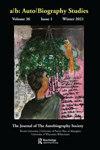“An Elegy of Place”: Affective Mapping in June Jordan’s Civil Wars
Q1 Arts and Humanities
引用次数: 0
Abstract
Abstract Most people know June Jordan the poet, the activist, the political essayist, and perhaps even the fiction writer. Fewer perhaps know her as an architect, urban planner, Black ecofeminist, and spatial theorist. This essay uses Jordan’s theories of place as a framework for her autobiographical writing, turning primarily to Civil Wars: Observations from the Front Lines of America (1981), a compilation of essays, letters, lectures, scenarios, diary entries, and reportage. An interdisciplinary approach that incorporates Black feminist autobiography scholarship, trauma and affect theory, and queer theory uncovers Civil Wars as both an autobiography of feeling and an archive of intellectual development. Jordan’s theory of place in Civil Wars functions as an architectural aesthetic that facilitates affective mapping—the movement of feeling between the self and the collective. Affective mapping allows Jordan to narrate a relational self by drawing on Black feelings that emerge within the intimacy of place and in the frequencies of Black sound.《地方的挽歌》:六月约旦内战中的情感映射
大多数人都知道琼·乔丹,她是诗人、活动家、政治散文家,甚至可能是小说作家。也许很少有人知道她是建筑师、城市规划师、黑人生态女权主义者和空间理论家。这篇文章使用乔丹的地方理论作为她自传写作的框架,主要转向《内战:来自美国前线的观察》(1981),这是一篇散文、信件、演讲、场景、日记和报告文学的汇编。这是一种跨学科的方法,结合了黑人女权主义自传学术,创伤和情感理论,以及酷儿理论,揭示了内战既是情感的自传,也是智力发展的档案。乔丹在《内战》中的位置理论作为一种建筑美学,促进了情感映射——自我和集体之间的情感运动。情感映射允许乔丹通过在亲密的地方和黑人声音的频率中描绘黑人的感觉来叙述一个关系自我。
本文章由计算机程序翻译,如有差异,请以英文原文为准。
求助全文
约1分钟内获得全文
求助全文
来源期刊

a/b: Auto/Biography Studies
Arts and Humanities-Literature and Literary Theory
CiteScore
0.80
自引率
0.00%
发文量
27
期刊介绍:
a /b: Auto/Biography Studies enjoys an international reputation for publishing the highest level of peer-reviewed scholarship in the fields of autobiography, biography, life narrative, and identity studies. a/b draws from a diverse community of global scholars to publish essays that further the scholarly discourse on historic and contemporary auto/biographical narratives. For over thirty years, the journal has pushed ongoing conversations in the field in new directions and charted an innovative path into interdisciplinary and multimodal narrative analysis. The journal accepts submissions of scholarly essays, review essays, and book reviews of critical and theoretical texts as well as proposals for special issues and essay clusters. Submissions are subject to initial appraisal by the editors, and, if found suitable for further consideration, to independent, anonymous peer review.
 求助内容:
求助内容: 应助结果提醒方式:
应助结果提醒方式:


